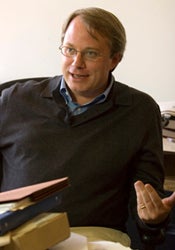Adrian Vermeule ’93 joined the faculty this year as a professor of law, coming from the University of Chicago Law School. Prior to his tenure there, he served as a law clerk to Judge David Sentelle of the U.S. Court of Appeals for the D.C. Circuit and then for Associate Justice Antonin Scalia ’60 of the U.S. Supreme Court. In his scholarship, Vermeule has focused primarily on constitutional law and theory, administrative law, legislation and national security law. He is the author of “Judging Under Uncertainty: An Institutional Theory of Legal Interpretation,” recently published by Harvard University Press, and also of “Terror in the Balance: Security, Liberty, and the Courts” (with Eric Posner ’91), released this week by Oxford University Press. Another of his books, “Mechanisms of Democracy: Institutional Design Writ Small,” will be published by Oxford in the spring. Here, he talks with HLT editor Robb London ’86.
Not really. Even the best-intentioned government will make policy mistakes, both in emergencies and normal times. And sometimes our government, like any other government, does not act with the best of intentions. The critical questions, however, are comparative, across both different policy environments and different institutions.
First, is the executive more likely to make mistakes – or more damaging mistakes – during emergencies than during normal times?
In “Terror in the Balance,” Eric Posner and I argue that executive performance during emergencies is not likely to be systematically worse than during normal times. The standard mechanisms that people often say are dominant during emergencies – panicky decision-making, oppression of minorities, and the stickiness of policies that temporarily dilute or suspend civil liberties – turn out to be theoretically incoherent or ungrounded in the evidence, in many cases. Even where they are cogent and attested by evidence, they occur with equal frequency during normal times. The worst examples of minority-oppressing policies in American history have had nothing to do with emergencies.
Second, do Congress and the courts have more to contribute during emergencies, or less to contribute?
The answer is less. Even as emergency conditions hamper executive decision-making, they hamper legislative and judicial decision-making much more. Sensible judges and legislators recognize this relative incapacity during emergencies and defer to the executive. That has been the consistent pattern of our history.
In “Judging under Uncertainty,” you write: “Where texts are intrinsically ambiguous, the legal system does best if judges assign the authority to interpret those texts to other institutions – administrative agencies in the case of statutes, legislatures in the case of the Constitution.” Why would agency bureaucrats do a better job of interpreting statutes than judges?
The benefits of a more expansive judicial role are speculative, while the costs – in added legal uncertainty and added layers of procedure, which cost time and money – are clear and substantial. Given this, the sensible designer of an interpretive system would not sacrifice certainty and spend resources for purely conjectural gains, and would opt for a tightly constrained judicial role.
Isn’t there a risk that agency interpretations could shift drastically from one administration to the next?
Agencies’ lack of independence has costs but also benefits. When people want to emphasize the latter, they point out that agencies are democratically accountable, more so than judges anyway. Judges’ insulation deprives them of crucial information they need to interpret statutes sensibly. They have to judge under uncertainty. If the worry is about interest-group influence on agencies, my colleague Einer Elhauge has pointed out that the same interest groups have an advantage in influencing judges as well, and for similar reasons.
Why do you believe that legislators – who often have no legal training – are in the best position to interpret ambiguous phrases in the Constitution?
Lawyers are well represented in legislatures. Before the recent elections, 53 percent of senators were lawyers, and 36 percent of House members. And, of course, legislatures are internally specialized. The committees that do the constitutional interpretation are dominated by lawyers. But more in the spirit of the question, developing ongoing constitutional law under open-ended or ambiguous provisions, like “due process of law,” is an unusual kind of legal work, much different than what most judges do most of the time. It’s a kind of legal work for which legislators’ professional capacities and institutional incentives are not obviously inferior to those of judges.
You also write: “[J]udges should sharply limit their interpretive ambitions, in part by limiting themselves to a small set of interpretive sources and a restricted range of relatively wooden decision-rules… Such rules may produce poor results in particular cases. Their justification is that they produce the best results overall.” Will citizens have faith in a system that disappoints them in their own cases?
That’s a real worry. What the book calls “the distorting force of the particular case” causes people, including judges, to underestimate the overall benefits of rules, where the costs of rules are especially vivid. Harvard scholar Fred Schauer emphasizes this in a wonderful recent article. Nonetheless, over time, social learning about the benefits of rules does occur. I believe the legal profession and maybe society generally have become more sophisticated about the costs and benefits of rules in the past generation.
